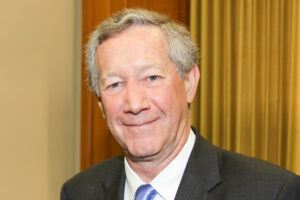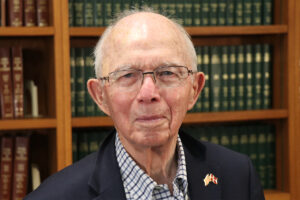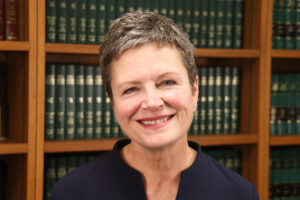Topic: Appellate Courts

Interview of Fred Six, December 4, 2021
Interviewed by Richard Ross and Deanell Tacha
This oral history interview of retired Supreme Justice Fred N. Six is the first of a series of interviews of retired justices, judges and court personnel to examine the Kansas judicial branch. In the interview Justice Six recounts his career as Judge of the Court of Appeals and Justice of the Kansas Supreme Court, reviewing changes in procedure that took place during his years on the courts and topics of litigation the courts reviewed. Six's explanation of how the Supreme Court operates is clear and interesting, especially as he discussed the "growing pains" brought about from the Show More"IT Revolution." He described precedent-setting opinions and the process of writing a dissent. A discussion of the medical malpractice issues highlighted the tension between the courts and the legislature when new policy is adopted. After Justice Six left the bench, he was asked to work with the Senate and House Judiciary committees to alter the Merit Selection plan of judges. work which was ongoing until 2011. The interview concludes with him stating that his greatest takeaway from his years of service was the establishment in 1992 of the Lawyers Fund for Client Protection. Show Less

Interview of Lawton Nuss, July 27, 2022
Interviewed by Richard Ross
Retired Chief Justice Lawton Nuss describes his attempts to be appointed to the Court of Appeals (he was not) and to the Supreme Court. Nuss served as Acting Chief during the illness of Chief Justice Davis. After becoming Chief Justice in 2010 he became the chief spokesman and administrator for the entire judicial branch of nearly 1600 employees and 250 judges. In 2014-15 he appointed a Court Budget Advisory committee to help resolve an eight million dollar budget shortfall. He discussed at length the legislative reaction to the Gannon v State school finance case which was Show Morefiled in 2010 and not finally resolved until 2019. Nuss describes his work with the conservative leadership in the state legislature, and a conservative governor, and their attempts to gain more control over the courts. He dealt with budget shortfalls that resulted in closing the courts; attempts to elect rather than appoint judges; and threats to change the role of the courts in the constitution. Nuss was a vigorous defender of the judicial system's independence against legislative interference. He cited the Supreme Court’s Solomon case which essentially answered the question, "‘Should the judicial branch have to give away some of its power granted directly by the people in their Constitution in order to get funding from the legislature.” The court's decisions on school finance continued to provoke the legislature during his tenure. Show Less

Interview of John Vratil, September 13, 2022
Interviewed by Joan Wagnon and David Heinemann
John Vratil served 14 years in the Kansas Senate, chairing the Judiciary Committee eight of those years and serving as Senate Vice-President for 10 years. Vratil was a leader in the Senate on both education and judiciary issues. He served on the Judicial Council helping the courts coordinate policy initiatives with the executive and legislative branches. He discusses the change in the power structure of the Senate, from "moderate Republican to Right Wing Conservative." He cites Medicaid expansion as one example of an issue popular the public, but not with the "right-wing" conservative majority. Vratil comments Show Morethat the declining number of lawyers in both the Senate and House may be due to the low salaries. Show Less

Interview of Ed Larson, November 4, 2022
Interviewed by Richard Ross
This interview of longtime Kansas lawyer and jurist, the Honorable Ed Larson, gives a clear understanding of the workings of both Kansas Court of Appeals and the Kansas Supreme Court. Joining the appellate court in 1987 as a general practice lawyer exposed him to many more criminal cases than he had seen in his practice in Hays. He liked the court's practice of traveling around the state for hearings. Larson believed that solving the problems of individuals was the most important work they did, although there were many high-profile cases such as the sale of Blue Cross Show MoreBlue Shield to an out-state company. Larson is a supporter of merit selection for judges and credits the availability of the retirement system for judges with allowing judges to retire with dignity and benefits. Show Less

Interview of Carol Beier, November 23, 2022
Interviewed by Richard Ross
Beier's interview explained how the judicial branch of government operates, showing how cases get to the Supreme Court and that the justices can only consider facts framed by the parties and their counsel. They don't "Google" for extra facts. They stay in the bounds of the facts as framed by the case. Beier is also an advocate for merit selection of judges and makes the case that merit selection is the most appropriate method. She gave examples of how retention elections operate. She told a story about a friend living in New York Show MoreCity who asked the question, "What do people do in Kansas?" The answer was "Everything important in life." Beier connected that response to her conclusion: A strong, healthy, supported Judiciary that understands it role and performs it well is part of "everything important in life."
Highlights -- short excerpts from the interview
